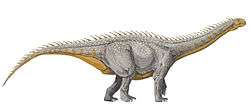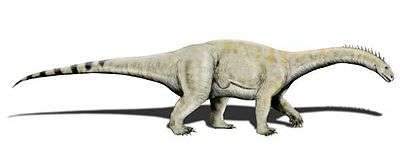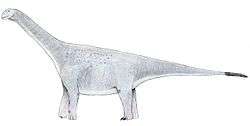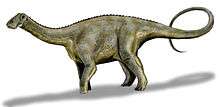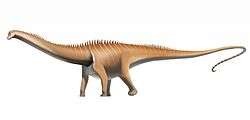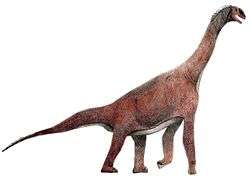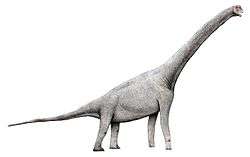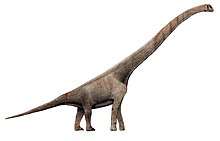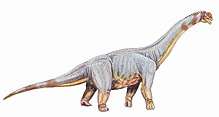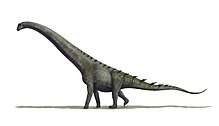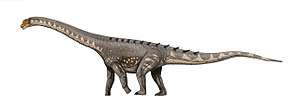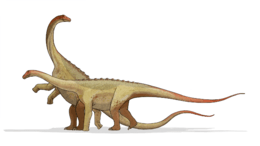Diplodocoidea
| Diplodocoids | |
|---|---|
.jpg) | |
| Holotype skeletons of Diplodocus carnegii and Apatosaurus louisae, Carnegie Museum of Natural History | |
| Scientific classification | |
| Kingdom: | Animalia |
| Phylum: | Chordata |
| Clade: | Dinosauria |
| Order: | Saurischia |
| Suborder: | †Sauropodomorpha |
| Clade: | †Sauropoda |
| Clade: | †Neosauropoda |
| Superfamily: | †Diplodocoidea Marsh, 1884 vide Upchurch, 1995 |
| Type species | |
| Diplodocus longus Marsh, 1878 | |
| Subgroups | |
| Synonyms | |
| |
Diplodocoidea is a superfamily of sauropod dinosaurs, which included some of the longest animals of all time, including slender giants like Supersaurus, Diplodocus, Apatosaurus, and Amphicoelias. Most had very long necks and long, whip-like tails; however, one family (the dicraeosaurids) are the only known sauropods to have re-evolved a short neck, presumably an adaptation for feeding low to the ground. This adaptation was taken to the extreme in the highly specialized sauropod Brachytrachelopan. A study of snout shape and dental microwear in diplodocoids showed that the square snouts, large proportion of pits, and fine subparallel scratches in Apatosaurus, Diplodocus, Nigersaurus, and Rebbachisaurus suggest ground-height nonselective browsing; the narrow snouts of Dicraeosaurus, Suuwassea, and Tornieria and the coarse scratches and gouges on the teeth of Dicraeosaurus suggest mid-height selective browsing in those taxa.[1] This taxon is also noteworthy because diplodocoid sauropods had the highest tooth replacement rates of any vertebrates, as exemplified by Nigersaurus, which had new teeth erupting every 30 days.[2]
Taxonomy
The below taxonomy follows the study of Emanuel Tschopp, Octavio Mateus and Roger Benson, 2015:[3]
- Diplodocoidea
The phylogenetics of Diplodocoidea were reviewed in 2015 with a specimen-level phylogenetic analysis, as well as a species-level analysis. Their cladistic analysis is shown below.[3]
| Diplodocoidea |
| ||||||||||||||||||||||||||||||||||||||||||||||||||||||||||||||||||||||||||||||||||||||||||||||||||||||||||||||||||||||||||||||||||||||||||||||||||||||||||||||||||||||||
References
- ↑ John A. Whitlock (6 April 2011) Inferences of Diplodocoid (Sauropoda: Dinosauria) Feeding Behavior from Snout Shape and Microwear Analyses
- ↑ Sereno, PC; Wilson, JA; Witmer, LM; Whitlock, JA; Maga, A; et al. (2007). "Structural Extremes in a Cretaceous Dinosaur". PLoS ONE. 2 (11): e1230. doi:10.1371/journal.pone.0001230. PMC 2077925. PMID 18030355.
- 1 2 Tschopp, E.; Mateus, O.; Benson, R.B.J. (2015). "A specimen-level phylogenetic analysis and taxonomic revision of Diplodocidae (Dinosauria, Sauropoda)". PeerJ. 3: e857. doi:10.7717/peerj.857. PMC 4393826. PMID 25870766.

